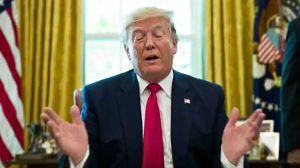In U-turn,BJP terms Sibal reforms illogical
A day after indicating its qualified go-ahead to the large-scale educational reforms being mooted by the Centre...
A day after indicating its qualified go-ahead to the large-scale educational reforms being mooted by the Centre,the BJP on Friday took a step back with former HRD minister Murli Manohar Joshi saying that the reforms were directionless and illogical and that they were an attack on the federal character of the country.
This is a federal government,a federal constitution. Education is on the concurrent list; states have not been consulted… Every state has different requirements and problems in education,especially in primary and secondary education, said Joshi,adding that a conclave of education ministers of the NDA-ruled states will be convened to formulate a common view on the subject.
RSS ideologue M G Vaidya,too,said the educational reforms being mooted were an attack on the diversity of the country. Asked why did the RSS,which otherwise favoured a centralised approach towards solving larger problems,favour a decentralised,localised approach on this issue,Vaidya said: We believe in unity,not uniformity. Vaidya was opposed to the idea of doing away with the examinations.
Deenanath Batra,associated with Shiksha Bachao Aandolan an RSS affiliate said the idea of having a common board amounted to running the education sector with a dictatorial attitude
The lack of clarity in the Parivar over an alternate roadmap for educational reforms was evident when N S Rawat,national secretary of Vidya Bharati an RSS affiliate that runs 30,000 schools said he was,in principle,not against the idea of doing away with examinations in schools.
Joshi,on the other hand,argued he was not against the idea of holding examinations for Class X,but favoured grades instead of marks.
While states like BJP-ruled Gujarat and party spokesperson Rajiv Pratap Rudy had given the reforms a qualified go-ahead on Thursday,Joshi spelt out the partys objections on Friday. A Gujarat functionary had only said that the idea of doing away with examinations was being discussed in the state. The reforms being suggested will only encourage videshikaran aur punjikaran (the moneyed and foreign powers increasing their influence) in the education sector, he said.
Photos




- 01
- 02
- 03
- 04
- 05



























